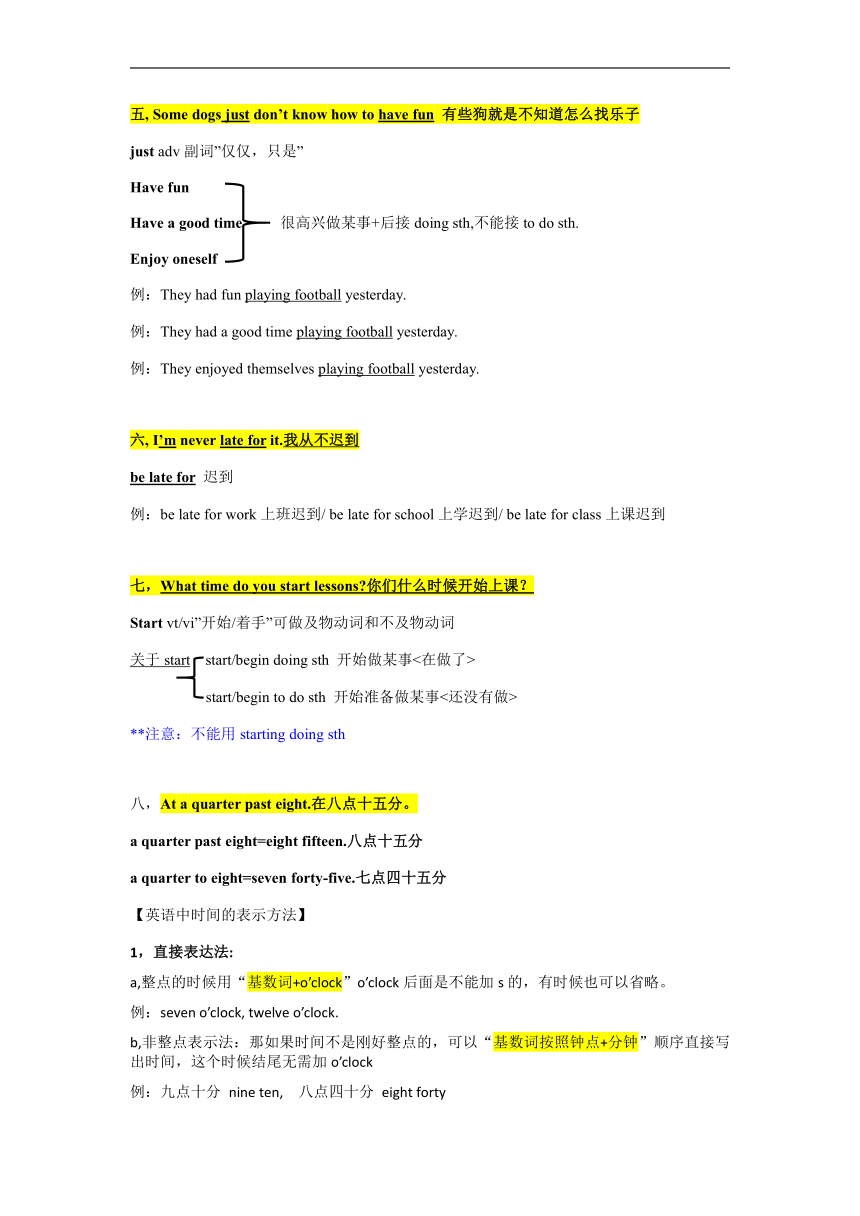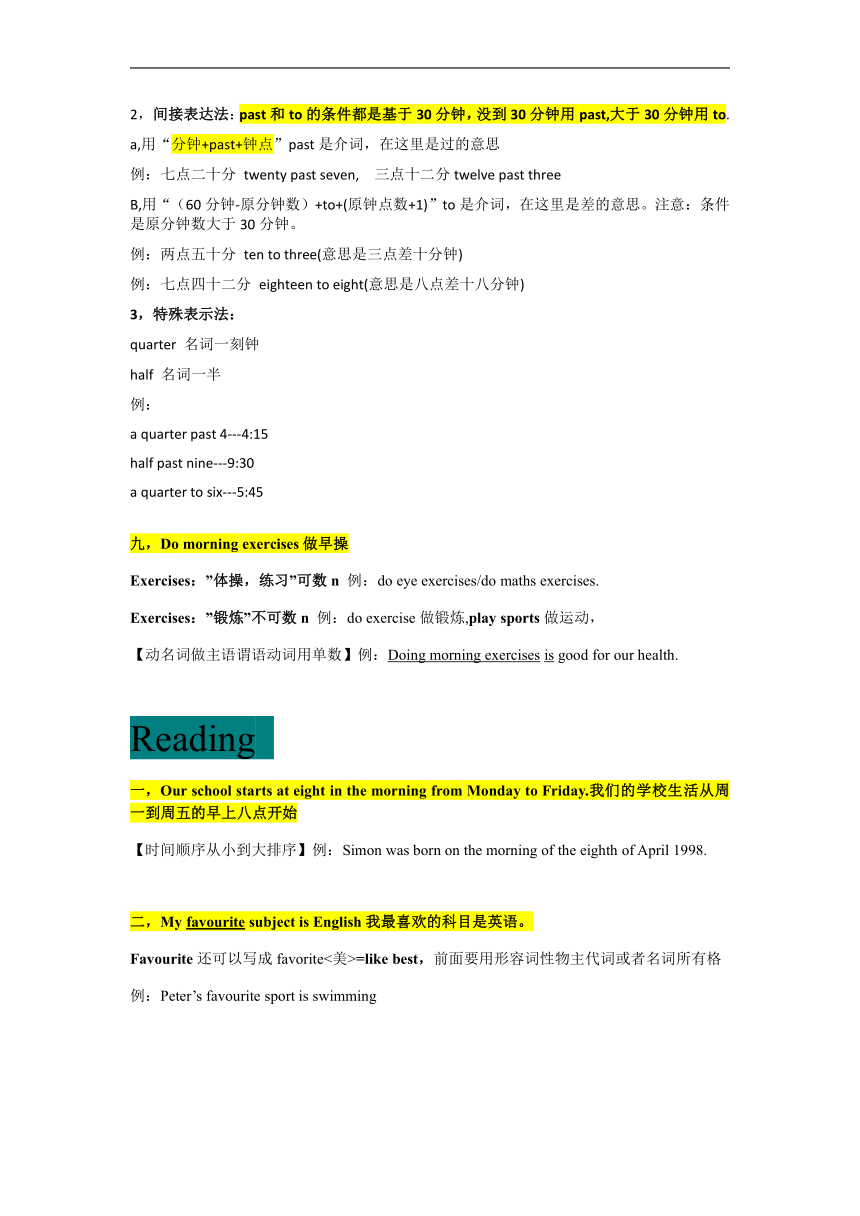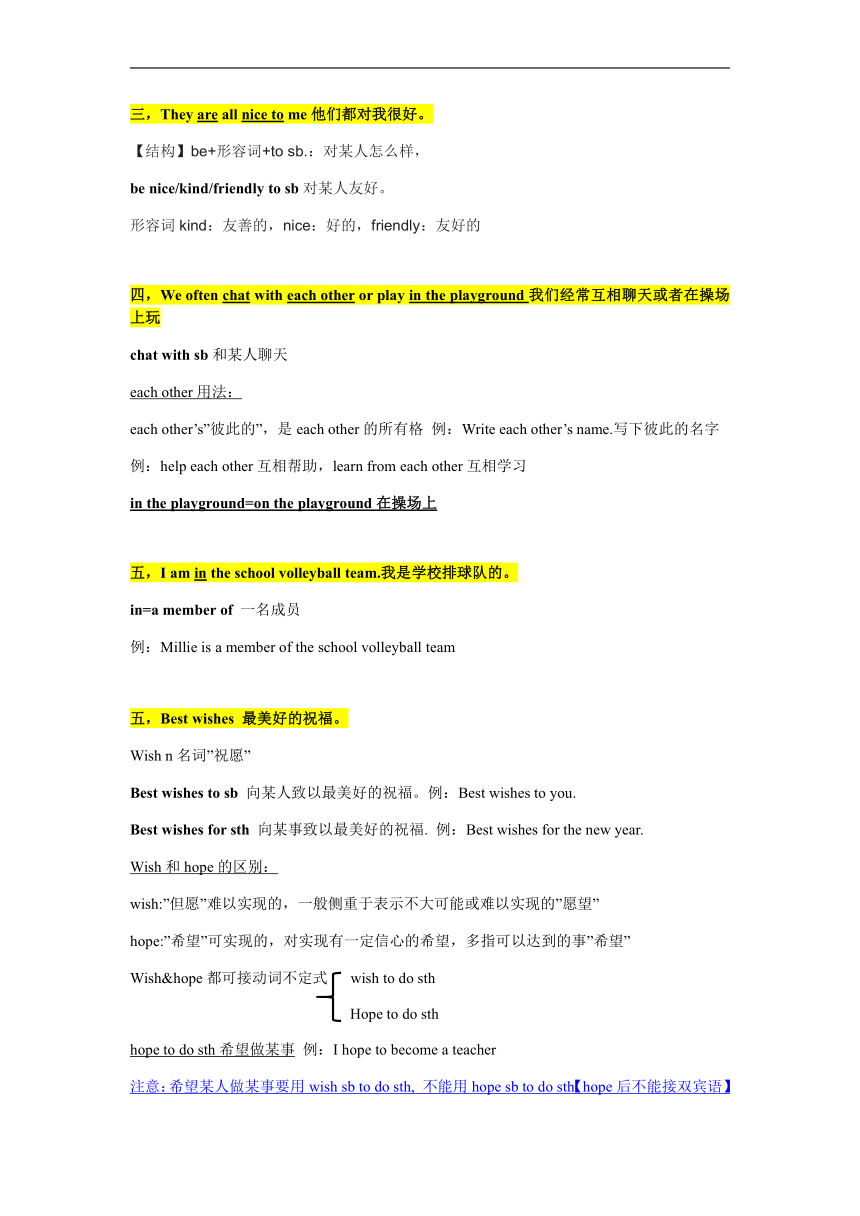牛津译林版七年级上册Unit 4 My day 复习(重难点归纳) 学案
文档属性
| 名称 | 牛津译林版七年级上册Unit 4 My day 复习(重难点归纳) 学案 |  | |
| 格式 | zip | ||
| 文件大小 | 42.6KB | ||
| 资源类型 | 教案 | ||
| 版本资源 | 牛津译林版 | ||
| 科目 | 英语 | ||
| 更新时间 | 2022-09-24 10:09:13 | ||
图片预览




文档简介
Unit 4 My day复习(重难点归纳)
Comic strip
Welcome to the unit
一. Wake up醒醒
Wake up【动副词组】
wake ab up 将某人叫醒--代词放中间,类似的词组还有:pick it up/put it on等
二,Is it time for breakfast 早餐时间到了吗?
<陈述句>It’s time for breakfast=It’s time to have breakfast该吃早餐了
It’s time for sth=It’s time to do sth
It’s time for+名词
It’s time to+动词
Shall we go walking in the hills 我们去山上散步好吗?
Shall v在表示提出或者征求意见,用于第一人称的复数。
go walking=go for a walk去散步
四, I always need a good rest.我总是需要好好休息。
always频度副词”总是100%”
频度副词:usually”通常”>often”经常,常常”>sometimes”有时”>seldom”很少”>never”从不”
Need vt需要
need to do sth需要做某事 例:We need to tell him the truth.
need sb to do sth需要某人做某事 例:I need you to help me with this problem。
don’t need to do sth=needn’t do sth=don’t have to do sth 不必要做某事。
五, Some dogs just don’t know how to have fun 有些狗就是不知道怎么找乐子
just adv副词”仅仅,只是”
Have fun
Have a good time 很高兴做某事+后接doing sth,不能接to do sth.
Enjoy oneself
例:They had fun playing football yesterday.
例:They had a good time playing football yesterday.
例:They enjoyed themselves playing football yesterday.
六, I’m never late for it.我从不迟到
be late for 迟到
例:be late for work上班迟到/ be late for school上学迟到/ be late for class上课迟到
What time do you start lessons 你们什么时候开始上课?
Start vt/vi”开始/着手”可做及物动词和不及物动词
关于start start/begin doing sth 开始做某事<在做了>
start/begin to do sth 开始准备做某事<还没有做>
**注意:不能用starting doing sth
At a quarter past eight.在八点十五分。
a quarter past eight=eight fifteen.八点十五分
a quarter to eight=seven forty-five.七点四十五分
【英语中时间的表示方法】
直接表达法:
a,整点的时候用“基数词+o’clock”o’clock后面是不能加s的,有时候也可以省略。
例:seven o’clock, twelve o’clock.
b,非整点表示法:那如果时间不是刚好整点的,可以“基数词按照钟点+分钟”顺序直接写出时间,这个时候结尾无需加o’clock
例:九点十分 nine ten, 八点四十分 eight forty
间接表达法:past和to的条件都是基于30分钟,没到30分钟用past,大于30分钟用to.
a,用“分钟+past+钟点”past是介词,在这里是过的意思
例:七点二十分 twenty past seven, 三点十二分twelve past three
B,用“(60分钟-原分钟数)+to+(原钟点数+1)”to是介词,在这里是差的意思。注意:条件是原分钟数大于30分钟。
例:两点五十分 ten to three(意思是三点差十分钟)
例:七点四十二分 eighteen to eight(意思是八点差十八分钟)
3,特殊表示法:
quarter 名词一刻钟
half 名词一半
例:
a quarter past 4---4:15
half past nine---9:30
a quarter to six---5:45
九,Do morning exercises做早操
Exercises:”体操,练习”可数n 例:do eye exercises/do maths exercises.
Exercises:”锻炼”不可数n 例:do exercise做锻炼,play sports做运动,
【动名词做主语谓语动词用单数】例:Doing morning exercises is good for our health.
Reading
Our school starts at eight in the morning from Monday to Friday.我们的学校生活从周一到周五的早上八点开始
【时间顺序从小到大排序】例:Simon was born on the morning of the eighth of April 1998.
二,My favourite subject is English我最喜欢的科目是英语。
Favourite还可以写成favorite<美>=like best,前面要用形容词性物主代词或者名词所有格
例:Peter’s favourite sport is swimming
三,They are all nice to me他们都对我很好。
【结构】be+形容词+to sb.:对某人怎么样,
be nice/kind/friendly to sb对某人友好。
形容词kind:友善的,nice:好的,friendly:友好的
We often chat with each other or play in the playground我们经常互相聊天或者在操场上玩
chat with sb和某人聊天
each other用法:
each other’s”彼此的”,是each other的所有格 例:Write each other’s name.写下彼此的名字
例:help each other互相帮助,learn from each other互相学习
in the playground=on the playground在操场上
五,I am in the school volleyball team.我是学校排球队的。
in=a member of 一名成员
例:Millie is a member of the school volleyball team
Best wishes 最美好的祝福。
Wish n名词”祝愿”
Best wishes to sb 向某人致以最美好的祝福。例:Best wishes to you.
Best wishes for sth 向某事致以最美好的祝福. 例:Best wishes for the new year.
Wish和hope的区别:
wish:”但愿”难以实现的,一般侧重于表示不大可能或难以实现的”愿望”
hope:”希望”可实现的,对实现有一定信心的希望,多指可以达到的事”希望”
Wish&hope都可接动词不定式 wish to do sth
Hope to do sth
hope to do sth希望做某事 例:I hope to become a teacher
注意:希望某人做某事要用wish sb to do sth, 不能用hope sb to do sth【hope后不能接双宾语】
【wish宾语从句】难以实现的”愿望”常用过去式
例:I wish I knew the answer我真希望我知道这个答案(实际上不知道)
例:I wish(that) I could fly我希望我能飞(其实是不可能的)
【hope(that)宾语从句】此处省略了that. 可实现的”希望”。
例:Our English teacher hopes we study hard at English.我们的英语老师希望我们那里学习英语
例:I hope he can do that我希望他能干那件事情
Integrated skills
一,Millie is talking with Simon about a volleyball match. Millie正在和Simon谈论排球比赛
Talk with/to sb和某人说话
区别 tell,speak,say,talk:
1,tell“告诉”注重说话的内容,又有告诉的对象
tell sb sth=tell sth to sb 【tell 后接双宾语】例:Tell me what the story is like.
2,speak”讲,说,发言”侧重讲话的动作而非内容.
speak+ 语言/speakto sb 例:He can speak three languages.
3,say “说,讲”指用语言表达思想,侧重于所说的具体内容.
say sth to sb/say to sb”...”例:he said thanks to the young man.
4,talk”谈话”,指双方之间的相互交谈.
talk to/with sb 例:They are talking over the phone.
二,There is a volleyball match between Sunshine Middle School and Moonlight Middle School阳光中学和月光中学之间有一场排球比赛。
There be句型:There be 后面的名词是句子的主语,所以There be 句型属于倒装句。
1,定义:英语中常用的句型,意思是"有",There在此结构中是引导词,已经没有副词"那里"的含义。表示:某地有某人或某物,强调"存在"。
2,肯定形式:There be+主语+地点/时间状语
There is+可数名词单数/不可数名词
There are+可数名词复数
**注意:
There be 有特点,主语放在be后面,就近原则是重点,单数is复数are.
变否定很简单,be后要把not添,变疑问也不难,把be提到there前。
肯定句中用some,否定和疑问句中用any.
Between:介词,表示两者之间,有时也可用于三者以上,强调两两之间的关系
例:What do you often do between classes 表示课间
三,How often do you go on a picnic 你多久去野餐一次?
go on a picnic= go for a picnic去野餐,复数形式是go on picnics
How often表示”多久一次”对频度副词提问
有关How的提问:
How often/How long/ How soon/ How far/ How much/ How many/How many times
How long表示”多久,多长”对时间或者物体的长短提问,常对for或者since引导的一段时间提问:例:for three hours,for 3 years=since 3 years ago(自从3年前一直至今)
How soon表示”多长/多少时间之后”,对将来时找中”in+时间段”提问
How far表示”离多远”,对路程和距离提问:例:three kilometres away,ten minutes’walk.
How much/ How many表示”多少”,对数量提问。对价格和金额的提问直接用How much
How many times表示”多少次”,对次数提问。
Task
一,They are good for us它们对我们有好处。
be good for/ be bad for...对...有好处/坏处
例: Too much work will be bad for you过度工作会对你有害
例: That will be bad for your health那对你的健康不利
二,They help us get ready for the day它们帮助我们为这一天做好准备.
get/be ready for sth为...准备好
get/be ready to do sth准备做某事
三,I can learn a lot about the world.我可以学到很多关于世界的东西
learn to do sth学习/学会做某事
例:I want to learn to swim this summer
a lot 许多,大量
四,We always have too much homework我们总是有太多的作业.
too much太多+不可数名词
too many太多+可数名词复数
much too 太+adj/adv 例:Today is much too cold.
**注意没有many too的用法
Grammar
【重点短语】
一,I would like to tell you about my life here.我想告诉你我在这里的生活。
Would 表示客气的建议或者邀请
Would like to do sth=want to do sth想要做某事。
life n名词”生活”=复数形式lives
My friend and I always have great fun then我的朋友和我总是玩得很开心。
have great fun =have a good time玩得开心
三,How often do they exercise 他们多久锻炼一次?
关于频度副词:
1,一般放在行为动词的前面,助动词/情态动词和be动词的后面:
2,频度副词有哪些:
always”总是100%”
usually”通常”80%
often”经常,常常”60%
sometimes”有时”40%
seldom”很少”20%
never”从不”0%
3,用How often提问的词还有 ①频度副词 ②every day/week ③once a week/month/year
例:How often do you go to see a film -- Seldom.
4,once/ twice /基数词+times+一段时间,仅对次数提问用How many times
例:How many times do you watch TV a week 你一个星期看几次电视?---Three times.
表示时间的介词(in/on/at)
我们可以在不同的时间前面使用in,on,at来表示做没事的时间。
1,in:一般用在”大于”一天 例:in 2022/ in August/ In summer
2,on:一般用在”等于”一天,具体的每一天前面 例:on Sunday/ on 1 August/ on Children’s Day
3,at:用在”某一时刻”,年龄,如果节日时间不止一天而是持续一段时间也用at
例:at seven o’clock/ at 6 years old/ at Christmas/ at the Spring Festival
**记忆小诀窍:
in年in月in四季,on日on号on星期,at加具体时间点
三长两短是例外:in the morning/afternoon/evening,at noon,at night
有些时间前不加时间介词,比如:last night,this morning,next weekend,every sunday 等
Comic strip
Welcome to the unit
一. Wake up醒醒
Wake up【动副词组】
wake ab up 将某人叫醒--代词放中间,类似的词组还有:pick it up/put it on等
二,Is it time for breakfast 早餐时间到了吗?
<陈述句>It’s time for breakfast=It’s time to have breakfast该吃早餐了
It’s time for sth=It’s time to do sth
It’s time for+名词
It’s time to+动词
Shall we go walking in the hills 我们去山上散步好吗?
Shall v在表示提出或者征求意见,用于第一人称的复数。
go walking=go for a walk去散步
四, I always need a good rest.我总是需要好好休息。
always频度副词”总是100%”
频度副词:usually”通常”>often”经常,常常”>sometimes”有时”>seldom”很少”>never”从不”
Need vt需要
need to do sth需要做某事 例:We need to tell him the truth.
need sb to do sth需要某人做某事 例:I need you to help me with this problem。
don’t need to do sth=needn’t do sth=don’t have to do sth 不必要做某事。
五, Some dogs just don’t know how to have fun 有些狗就是不知道怎么找乐子
just adv副词”仅仅,只是”
Have fun
Have a good time 很高兴做某事+后接doing sth,不能接to do sth.
Enjoy oneself
例:They had fun playing football yesterday.
例:They had a good time playing football yesterday.
例:They enjoyed themselves playing football yesterday.
六, I’m never late for it.我从不迟到
be late for 迟到
例:be late for work上班迟到/ be late for school上学迟到/ be late for class上课迟到
What time do you start lessons 你们什么时候开始上课?
Start vt/vi”开始/着手”可做及物动词和不及物动词
关于start start/begin doing sth 开始做某事<在做了>
start/begin to do sth 开始准备做某事<还没有做>
**注意:不能用starting doing sth
At a quarter past eight.在八点十五分。
a quarter past eight=eight fifteen.八点十五分
a quarter to eight=seven forty-five.七点四十五分
【英语中时间的表示方法】
直接表达法:
a,整点的时候用“基数词+o’clock”o’clock后面是不能加s的,有时候也可以省略。
例:seven o’clock, twelve o’clock.
b,非整点表示法:那如果时间不是刚好整点的,可以“基数词按照钟点+分钟”顺序直接写出时间,这个时候结尾无需加o’clock
例:九点十分 nine ten, 八点四十分 eight forty
间接表达法:past和to的条件都是基于30分钟,没到30分钟用past,大于30分钟用to.
a,用“分钟+past+钟点”past是介词,在这里是过的意思
例:七点二十分 twenty past seven, 三点十二分twelve past three
B,用“(60分钟-原分钟数)+to+(原钟点数+1)”to是介词,在这里是差的意思。注意:条件是原分钟数大于30分钟。
例:两点五十分 ten to three(意思是三点差十分钟)
例:七点四十二分 eighteen to eight(意思是八点差十八分钟)
3,特殊表示法:
quarter 名词一刻钟
half 名词一半
例:
a quarter past 4---4:15
half past nine---9:30
a quarter to six---5:45
九,Do morning exercises做早操
Exercises:”体操,练习”可数n 例:do eye exercises/do maths exercises.
Exercises:”锻炼”不可数n 例:do exercise做锻炼,play sports做运动,
【动名词做主语谓语动词用单数】例:Doing morning exercises is good for our health.
Reading
Our school starts at eight in the morning from Monday to Friday.我们的学校生活从周一到周五的早上八点开始
【时间顺序从小到大排序】例:Simon was born on the morning of the eighth of April 1998.
二,My favourite subject is English我最喜欢的科目是英语。
Favourite还可以写成favorite<美>=like best,前面要用形容词性物主代词或者名词所有格
例:Peter’s favourite sport is swimming
三,They are all nice to me他们都对我很好。
【结构】be+形容词+to sb.:对某人怎么样,
be nice/kind/friendly to sb对某人友好。
形容词kind:友善的,nice:好的,friendly:友好的
We often chat with each other or play in the playground我们经常互相聊天或者在操场上玩
chat with sb和某人聊天
each other用法:
each other’s”彼此的”,是each other的所有格 例:Write each other’s name.写下彼此的名字
例:help each other互相帮助,learn from each other互相学习
in the playground=on the playground在操场上
五,I am in the school volleyball team.我是学校排球队的。
in=a member of 一名成员
例:Millie is a member of the school volleyball team
Best wishes 最美好的祝福。
Wish n名词”祝愿”
Best wishes to sb 向某人致以最美好的祝福。例:Best wishes to you.
Best wishes for sth 向某事致以最美好的祝福. 例:Best wishes for the new year.
Wish和hope的区别:
wish:”但愿”难以实现的,一般侧重于表示不大可能或难以实现的”愿望”
hope:”希望”可实现的,对实现有一定信心的希望,多指可以达到的事”希望”
Wish&hope都可接动词不定式 wish to do sth
Hope to do sth
hope to do sth希望做某事 例:I hope to become a teacher
注意:希望某人做某事要用wish sb to do sth, 不能用hope sb to do sth【hope后不能接双宾语】
【wish宾语从句】难以实现的”愿望”常用过去式
例:I wish I knew the answer我真希望我知道这个答案(实际上不知道)
例:I wish(that) I could fly我希望我能飞(其实是不可能的)
【hope(that)宾语从句】此处省略了that. 可实现的”希望”。
例:Our English teacher hopes we study hard at English.我们的英语老师希望我们那里学习英语
例:I hope he can do that我希望他能干那件事情
Integrated skills
一,Millie is talking with Simon about a volleyball match. Millie正在和Simon谈论排球比赛
Talk with/to sb和某人说话
区别 tell,speak,say,talk:
1,tell“告诉”注重说话的内容,又有告诉的对象
tell sb sth=tell sth to sb 【tell 后接双宾语】例:Tell me what the story is like.
2,speak”讲,说,发言”侧重讲话的动作而非内容.
speak+ 语言/speakto sb 例:He can speak three languages.
3,say “说,讲”指用语言表达思想,侧重于所说的具体内容.
say sth to sb/say to sb”...”例:he said thanks to the young man.
4,talk”谈话”,指双方之间的相互交谈.
talk to/with sb 例:They are talking over the phone.
二,There is a volleyball match between Sunshine Middle School and Moonlight Middle School阳光中学和月光中学之间有一场排球比赛。
There be句型:There be 后面的名词是句子的主语,所以There be 句型属于倒装句。
1,定义:英语中常用的句型,意思是"有",There在此结构中是引导词,已经没有副词"那里"的含义。表示:某地有某人或某物,强调"存在"。
2,肯定形式:There be+主语+地点/时间状语
There is+可数名词单数/不可数名词
There are+可数名词复数
**注意:
There be 有特点,主语放在be后面,就近原则是重点,单数is复数are.
变否定很简单,be后要把not添,变疑问也不难,把be提到there前。
肯定句中用some,否定和疑问句中用any.
Between:介词,表示两者之间,有时也可用于三者以上,强调两两之间的关系
例:What do you often do between classes 表示课间
三,How often do you go on a picnic 你多久去野餐一次?
go on a picnic= go for a picnic去野餐,复数形式是go on picnics
How often表示”多久一次”对频度副词提问
有关How的提问:
How often/How long/ How soon/ How far/ How much/ How many/How many times
How long表示”多久,多长”对时间或者物体的长短提问,常对for或者since引导的一段时间提问:例:for three hours,for 3 years=since 3 years ago(自从3年前一直至今)
How soon表示”多长/多少时间之后”,对将来时找中”in+时间段”提问
How far表示”离多远”,对路程和距离提问:例:three kilometres away,ten minutes’walk.
How much/ How many表示”多少”,对数量提问。对价格和金额的提问直接用How much
How many times表示”多少次”,对次数提问。
Task
一,They are good for us它们对我们有好处。
be good for/ be bad for...对...有好处/坏处
例: Too much work will be bad for you过度工作会对你有害
例: That will be bad for your health那对你的健康不利
二,They help us get ready for the day它们帮助我们为这一天做好准备.
get/be ready for sth为...准备好
get/be ready to do sth准备做某事
三,I can learn a lot about the world.我可以学到很多关于世界的东西
learn to do sth学习/学会做某事
例:I want to learn to swim this summer
a lot 许多,大量
四,We always have too much homework我们总是有太多的作业.
too much太多+不可数名词
too many太多+可数名词复数
much too 太+adj/adv 例:Today is much too cold.
**注意没有many too的用法
Grammar
【重点短语】
一,I would like to tell you about my life here.我想告诉你我在这里的生活。
Would 表示客气的建议或者邀请
Would like to do sth=want to do sth想要做某事。
life n名词”生活”=复数形式lives
My friend and I always have great fun then我的朋友和我总是玩得很开心。
have great fun =have a good time玩得开心
三,How often do they exercise 他们多久锻炼一次?
关于频度副词:
1,一般放在行为动词的前面,助动词/情态动词和be动词的后面:
2,频度副词有哪些:
always”总是100%”
usually”通常”80%
often”经常,常常”60%
sometimes”有时”40%
seldom”很少”20%
never”从不”0%
3,用How often提问的词还有 ①频度副词 ②every day/week ③once a week/month/year
例:How often do you go to see a film -- Seldom.
4,once/ twice /基数词+times+一段时间,仅对次数提问用How many times
例:How many times do you watch TV a week 你一个星期看几次电视?---Three times.
表示时间的介词(in/on/at)
我们可以在不同的时间前面使用in,on,at来表示做没事的时间。
1,in:一般用在”大于”一天 例:in 2022/ in August/ In summer
2,on:一般用在”等于”一天,具体的每一天前面 例:on Sunday/ on 1 August/ on Children’s Day
3,at:用在”某一时刻”,年龄,如果节日时间不止一天而是持续一段时间也用at
例:at seven o’clock/ at 6 years old/ at Christmas/ at the Spring Festival
**记忆小诀窍:
in年in月in四季,on日on号on星期,at加具体时间点
三长两短是例外:in the morning/afternoon/evening,at noon,at night
有些时间前不加时间介词,比如:last night,this morning,next weekend,every sunday 等
同课章节目录
- 预备课程
- Lesson 1 Nice to meet you !
- Lesson 2 A happy family
- Lesson 3 A nice school
- Lesson 4 You look cool !
- Lesson 5 Wonderful things
- Lesson 6 Have nice food
- Lesson 7 Enjoy our days
- Lesson 8 Let's have fun !
- Unit 1 This is me
- Unit 2 Let's play sports
- Unit 3 Welcome to our school
- Unit 4 My day
- Unit 5 Let’s celebrate
- Unit 6 Food and lifestyle
- Unit 7 Shopping
- Unit 8 Fashion
